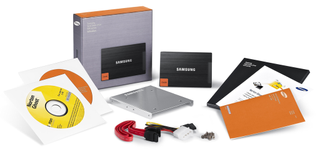Samsung Goes 6 Gb/s: Is The 830-Series SSD King Of The Hill?
Where Does Samsung's 830-Series SSD Stand?
A few months back (when it was the only second-gen SandForce drive around), we proclaimed the Vertex 3 to be the fastest MLC-based SSD for consumers. Since that time, we've seen other solid-state solutions based on the same controller (like Patriot's Wildfire) steal the spotlight using faster memory interfaces. No matter the brand, though, SSDs based on SandForce's technology are clearly the performance benchmark everyone else is trying to beat.
However, when it comes to working with non-compressible data, SandForce's technology doesn't allow you to realize the architecture's best possible performance. For customers who'd rather not run the averages of compressible versus non-compressible information on their machines, an alternative approach might be preferable. That's what attracts many to Intel's SSD 510 and Crucial's m4.
Samsung's latest SSD shakes up the status quo in a very unexpected way. The 830 delivers its performance without a suite of secret sauce wrapped up in marketing terminology, and it's fast enough to succeed the bevy of SSDs based on SandForce's controller hardware. Its performance is sufficient to even provide a small (but clear) lead over Intel's SSD 510 and Crucial's m4.

Although the 830 does serve up incredible speed, it's not a chart-topper in every benchmark. It seems to struggle with random read and write operations. At low queue depths, its random read performance is better than the 240 GB Vertex 3. However, the 256 GB 830 falls behind Crucial's m4 at the same capacity point. Once you turn up queue depths, both OCZ's drive and the m4 surpass it. Random writes bring us even worse news, as the m4 is able to outperform the 830 by up to 60 percent, while the Vertex 3 delivers twice the performance.
In sequential transfers, Samsung's 830 really shines. For the average desktop user, that's great news. Very few applications and consumer usage models are bound by random I/O. If you don't believe us, take a look at SSD Performance In Crysis 2, World Of Warcraft, And Civilization V. Although we'd probably think twice before picking this as our first choice for a database server, it does just fine in an enthusiast's machine.
The combination of screaming sequentials and so-so random performance makes the Samsung 830 seems like a supercharged Intel SSD 510. We're not as awed by it as we were when OCZ first showed us the Vertex 3, but to be frank, we're standing in the midst of a lot of very fast SSDs right now. In that context, Samsung's 830 performs like a drag racer that puts its rubber down on flat pavement and in a straight line. Meanwhile, the m4 and second-gen SandForce drives are the 4x4s, ready to handle any terrain you put in front of them.
Stay on the Cutting Edge
Join the experts who read Tom's Hardware for the inside track on enthusiast PC tech news — and have for over 25 years. We'll send breaking news and in-depth reviews of CPUs, GPUs, AI, maker hardware and more straight to your inbox.
Current page: Where Does Samsung's 830-Series SSD Stand?
Prev Page PCMark 7: Storage Suite-
pbrigido With all of these fast SSDs coming to market, I can only hope that the competition starts to drive down prices soon.Reply -
I still opt for the M4 in all the enthusiast builds I do!Reply
It boils down to reliability, not one hiccup on M4 yet (or any crucial drive Ive installed), 4/5 Sandforce drives I have installed have had some form of callback problem to resolve once deployed, mostly requiring firmware updates, but a few failed drives as well!
Mind you, still better than the early Corsair force Series I used, every single one failed! Stopped using them quick!
Am tempted by OCZ, once they have reliability on their side I will give them a go again! -
Would love to see an article addressing Sandforce controller problems people have been experiencing.Reply
-
mark_hamill Would love to see an article addressing Sandforce controller problems people have been experiencing.Reply -
JamesSneed Looks like a really nice SSD. Samsung has one of the best validation proceses along with Intel and Crucial so I really don't expect people to have issues like they do with OCZ drives. Now the real question how much will it be on the egg?Reply
I saw this quote below in the summary and laughed as nobody in there right mind would use a basic MLC drive in a database server. So Samsung tuned the drive for what it will be used in ,desktops, good.
"Although we'd probably think twice before picking this as our first choice for a database server, it does just fine in an enthusiast's machine." -
JohnnyLucky great review. now we just have to wait and see how the ssd will hold up over the long haul. If it is anything like the 470, then it should be problem free.Reply -
beenthere We'll see how this series of Samsung SSDs fair. The previous gen was a nightmare of problems so I don't think Samsung's validation process is any better that the rest of the SSD suppliers - which is sad when Samsung controls everything including NAND production. It's amazing that we still have SSDs NOT readt for Prime Time.Reply -
AppleBlowsDonkeyBalls beenthereWe'll see how this series of Samsung SSDs fair. The previous gen was a nightmare of problems so I don't think Samsung's validation process is any better that the rest of the SSD suppliers - which is sad when Samsung controls everything including NAND production. It's amazing that we still have SSDs NOT readt for Prime Time.Reply
Proof? I think you just pulled this out of your ass or from someone's that told you some story. The 470 series was VERY reliable.
Most Popular

